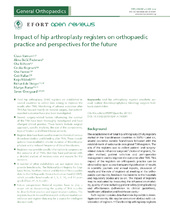| dc.contributor.author | Varnum, Claus | en_US |
| dc.contributor.author | Pedersen, Alma Bečić | en_US |
| dc.contributor.author | Rolfson, Ola | en_US |
| dc.contributor.author | Rogmark, Cecilia | en_US |
| dc.contributor.author | Furnes, Ove | en_US |
| dc.contributor.author | Hallan, Geir | en_US |
| dc.contributor.author | Mäkelä, Keijo | en_US |
| dc.contributor.author | de Steiger, Richard | en_US |
| dc.contributor.author | Porter, Martyn | en_US |
| dc.contributor.author | Overgaard, Søren | en_US |
| dc.date.accessioned | 2020-08-07T13:24:18Z | |
| dc.date.available | 2020-08-07T13:24:18Z | |
| dc.date.issued | 2019 | |
| dc.Published | Varnum C, Pedersen, Rolfson O, Rogmark C, Furnes O, Hallan G, Mäkelä K, de Steiger R, Porter, Overgaard S. Impact of hip arthroplasty registers on orthopaedic practice and perspectives for the future. EFORT Open Reviews. 2019;4(6):368-376 | eng |
| dc.identifier.issn | 2058-5241 | |
| dc.identifier.issn | 2396-7544 | |
| dc.identifier.uri | https://hdl.handle.net/1956/23582 | |
| dc.description.abstract | Total hip arthroplasty (THA) registers are established in several countries to collect data aiming to improve the results after THA. Monitoring of adverse outcomes after THA has focused mainly on revision surgery, but patient-reported outcomes have also been investigated. Several surgery-related factors influencing the survival of the THA have been thoroughly investigated and have changed clinical practice. These factors include surgical approach, specific implants, the size of the components, type of fixation and different bone cements. Register data have been used to examine the risk of venous thromboembolism and bleeding after THA. These investigations have resulted in shorter duration of thromboprophylaxis and a reduced frequency of blood transfusion. Registers may provide specific information to surgeons on the outcome of all THAs that they have performed with a detailed analysis of revisions rates and reasons for the revisions. A number of other stakeholders can use register data to provide benchmarks. The National Joint Registry for England, Wales, Northern Ireland and the Isle of Man supplies data to the Orthopaedic Device Evaluation Panel (ODEP), which provides benchmarks at 3, 5, 7, 10, and 13 years graded from A*, A, B and C. Future perspectives: National registers have to play a major role in documenting the quality of THA in order to describe best practice and report implant outliers. The registers have to be used for research and post-market surveillance and register data may be a source for intelligent decision tools. | en_US |
| dc.language.iso | eng | eng |
| dc.publisher | British Editorial Society of Bone and Joint Surgery | eng |
| dc.rights | Attribution-Non Commercial CC BY-NC | eng |
| dc.rights.uri | http://creativecommons.org/licenses/by-nc/4.0/ | eng |
| dc.title | Impact of hip arthroplasty registers on orthopaedic practice and perspectives for the future | en_US |
| dc.type | Peer reviewed | |
| dc.type | Journal article | |
| dc.date.updated | 2020-02-10T18:19:14Z | |
| dc.description.version | publishedVersion | en_US |
| dc.rights.holder | Copyright 2019 The Authors | |
| dc.identifier.doi | https://doi.org/10.1302/2058-5241.4.180091 | |
| dc.identifier.cristin | 1759716 | |
| dc.source.journal | EFORT Open Reviews | |

